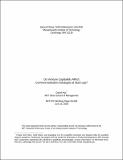| dc.description.abstract | I empirically study the effect of venture capital (VC) on product development and
commercialization strategy of start-up organizations. In doing so, I segment entrant
commercialization strategies into two camps according to competitive effect: to
“cooperate” is to license-out technology or be acquired, while to “compete” is to develop
technology independently. Building on the work of Gans, Hsu, and Stern (2000) on the
drivers of entrant commercialization strategy, this paper examines the direct and indirect
effects of VC on product development and competition. I start with two important
determinants of start-up commercialization strategy: (1) the entrant’s relative investment
cost of acquiring and controlling complementary assets needed to successfully
commercialize its innovation, and (2) the entrant’s ability to effectively protect its
intellectual property. I then test a novel sample of 118 technology-based projects divided
almost evenly between two mechanisms of entrepreneurial finance. These two
mechanisms differ in institutional detail in ways that allow a quasi-experiment of the
effect of VC on start-up commercialization strategy. The U.S. Small Business Innovative
Research (SBIR) program provides a grant to R&D without taking equity in a start-up or
changing the corporate governance of project development. In contrast, VCs take an
equity stake and participate in corporate governance in exchange for capital. Neither of
these financing mechanisms, however, alters the underlying complementary asset or
intellectual property regime associated with the project. Two main findings about the
commercialization strategy and product market effects of venture capital emerge: (1) VCbacking
skews commercialization strategies across industries toward cooperating, and (2)
VCs make their portfolio firms more sensitive to the business environment. | en |
